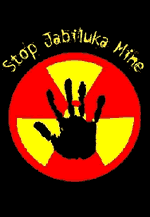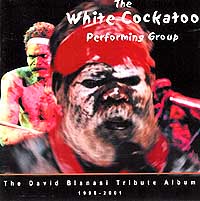Home
| Albums | Films
| Didjeridu
| Library
Traditional
Aboriginal
Arnhem Land Music
Discography Search


|
| The
White Cockatoo Performing Group: The David Blanasi
Tribute Album 1998-2001 |
|
Artist/Collector:
|
David
Blanasi |
|
Label
Information:
|
Big
Bang Records |
|
Media
Type:
|
CD |
|
Year:
|
2002 |
|
Availability:
|
U.S. and Canadian
customers may purchase this album via PayPal by
clicking on the button to the right.
Or,
you may send a check or money order for $18.00
to:
John Burrows
P.O. Box 2574
Olympia, WA
98507-2574
Foreign
customers should contact the nice folks at Skinnyfish
Music
|
|

|
| Notes: |
This
unique performing company comes from Arnhem Land in
the Northern Territory of Australia. The artists are
a group of senior Aboriginal men from the Mialili, Rembarrnga,
Guningu and Burrara language groups, who share the same
social and family affiliations. Their country is the
traditional birthplace and home of the Australian Aboriginal
musical instrument, the Didjeridu.
The
company founder, didjeridu master David Blanasi, traveled
extensively throughout the world for over three decades
and it was he who brought the didjeridu to national
and international prominence for the first time. His
extraordinary virtuosity made him the 'free jazz' master
of the Western Arnhem Land 'Gunborg' tradition, where
the continuous drone of the didjeridu is syncopated
in time with the songmen.
In
the years 1998-2001 Western Arnhem Land first lost songmaster
Djoli Laiwanga (the Black Cockatoo) and then his didjeridu
master David Blanasi (the White Cockatoo). Their corroboree
was passed on to the songmasters Jack Nawilill and David
Yirindilli. Jack and David have inherited these songs
in what is one of the world's oldest unbroken artistic
traditions. Despite the prominence of the didjeridu,
it is the songmen who own and create the songs and decide
what kind of accompaniment the didjeridu player will
provide.
Jack
Nawilill and David Yirindilli have chosen Darryl Dikarrna
Brown as their didjeridu accompanist and Darryl now
proudly plays in the tradition of his late and great
didjeridu master, David Blanasi, who is remembered every
time the White Cockatoo Performing Group appear in Australia
or around the world.
|
| Track Number |
Track Title |
Track Time |
Notes |
|
01
|
Argument
Song |
0:02:11 |
Songmen:
Jack Nawilill and David Yirindilli, Didjeridu: David Blanasi.
Girlfriend and boyfriend are arguing. The girl is following
another man and out in the scrub the two of them are arguing
loudly. Big story that one! (Adelaide Festival Centre
Amphitheatre, Australia, February 2000) |
|
02
|
Gordo:
The Brolga Didjeridu Solo |
0:00:58 |
Didjeridu:
David Blanasi. These are happy birds all the time talking
to each other. These solos and calls are not a tradition.
David Blanasi created them as a way to make a bridge between
his own and western culture. (Adelaide Festival Centre
Amphitheatre, Australia, February 2000) |
|
03
|
Didjeridu
Solo by Darryl Dikarrna Brown |
0:00:47 |
Didjeridu:
Darryl Dikarrna Brown. (Adelaide Festival Centre Amphitheatre,
February 2000) |
|
04
|
Djang |
0:02:41 |
Songmen:
Jack Nawilill and David Yirindilli, Didjeridu: Darryl
Dikarrna Brown. The girls go hunting for small black and
yellow fresh water fish. There are kids everywhere. (Adelaide
Festival Centre Amphitheatre, Australia, February 2000) |
|
05
|
Bush
Potato, The Short Yam |
0:02:03 |
Songmen:
Jack Nawilill and David Yirindilli, Didjeridu: David Blanasi.
The yam is too hot to eat when it is taken straight from
the fire. If you put it in some cold water then you can
eat it without burning your mouth. (Adelaide Festival
Centre Amphitheatre, Australia, February 2000) |
|
06
|
Mimi
Spirit |
0:01:45 |
Songmen:
Jack Nawilill and Tom Kelly, Didjeridu: David Blanasi.
Wapukurra is an old man, the boss and father of the Mimi
Spirits. This is a very old song. Wapukurra meets up with
the Mimis. He has one bad leg and can't move around so
he stays in the rock. Mimi spirits are long, frail, skinny
earth spirits who live in rocks. (San Diego, CA, USA,
August 1999) |
|
07
|
Mimi
Spirit, Wapukurra |
0:02:00 |
Songman:
David Yirindilli, Didjeridu: Darryl Dikarrna Brown. Featuring
David Yirindilli's amazing singing voice and Darryl Dikarrna
Brown's sublime didjeridu accompaniment. Compare this
same Mimi spirit song to the last track. (Tampere, Finland,
August 2001) |
|
08
|
Bini
Bini |
0:01:51 |
Songman:
David Yirindilli, Didjeridu: Darryl Dikarrna Brown. All
the girls and old people traveled all the time. They carried
all their swag. They can't find any water. They find one
old one who says 'go straight this way and you will find
water.' He is right and they find that water. (The 'buzz'
that can be heard early in this track is the sound technician's
mobile phone ringing.) (Tampere, Finland, August 2001) |
|
09
|
Dingo
Lonely for its Mate Didjeridu Solo |
0:00:59 |
Didjeridu:
David Blanasi. The wild dog howling. (Duke University,
Durham, N.C., USA, November 1998) |
|
10
|
Gordo:
The Brolga Didjeridu Solo |
0:00:50 |
Didjeridu:
David Blanasi. The stately large wading birds that inhabit
the wetlands. (Duke University, Durham, N.C., USA, November
1998) |
|
11
|
Dry
Land Devil Devil |
0:02:37 |
Songmen:
Jack Nawilill and David Yirindilli, Didjeridu: David Blanasi.
You might be traveling in the night in dry country and
you see a big light coming down from a star! This devil
can come in the night and kill you! If you are a clever
man (shaman) you can fight back. He comes from the dry
country down like Alice Springs. He's got very big ears.
(Arnhem Land, 1998) |
|
12
|
Two
days sleep |
0:01:52 |
Songmen:
Jack Nawilill and David Yirindilli, Didjeridu: David Blanasi.
Two days of camping and waiting. He looks for people,
he sees tracks and he follows them but can't find anybody
and he says 'No one helps me!' (Arnhem Land, 1998) |
|
13
|
Top
of the Palm Tree |
0:02:35 |
Songmen:
Jack Nawilill and David Yirindilli, Didjeridu: David Blanasi.
The palm tree is good tucker. Up the top of these small
palms the flesh can be made into fine flour. This is then
baked in the fire like damper (bread). (Arnhem Land, 1998) |
|
14
|
Short
Argument |
0:01:43 |
Songmen:
Jack Nawilill and David Yirindilli, Didjeridu: David Blanasi.
A short argument between two brothers. You sing this song!
No you! No, you sing it! No you! Etc. (Arnhem Land, 1998) |
|
15
|
New
Rain, New Water Coming |
0:03:03 |
Songmen:
Jack Nawilill and David Yirindilli, Didjeridu: David Blanasi.
Here the water running in a river is very strong. The
river has risen with this new water and one fellow says
it is too strong to attempt to swim across. We must wait!
(Arnhem Land, 1998) |
|
16
|
Foot
Track |
0:02:41 |
Songmen:
Jack Nawilill and David Yirindilli, Didjeridu: David Blanasi.
Here we are looking at footprints. Now we will try and
follow them and see if we can find someone. Might be someone
who has run away! (Arnhem Land, 1998) |
|
17
|
Muk
Muk: The Boobook Night Owl |
0:01:30 |
Songmen:
Jack Nawilill and David Yirindilli, Didjeridu: David Blanasi.
In a graveyard, Djoli Laiwanga was taught many songs by
a Boobook owl. Every night he visited the grave of an
old woman, an owl perched in a tree above, taught him
songs. It was the spirit of the dead woman speaking through
the owl. (Arnhem Land, 1998) |
|
18
|
Mammorye:
The Green Plum |
0:03:17 |
Songmen:
Jack Nawilill and David Yirindilli, Didjeridu: David Blanasi.
This song was composed by Djoli Laiwanga. Here two fellows
are walking and old Djoli says, 'come here look, Mammorye!
Help yourself, we can have a good feed.' Sometimes the
plum is crushed with a stone. (Arnhem Land, 1998) |
|
19
|
New
Rain |
0:03:09 |
Songmen:
Jack Nawilill and David Yirindilli, Didjeridu: David Blanasi.
In the morning they come looking for water and they find
a round Billabong (water hole) and they find a lot of
fish. 'Come down here! We're going to get these fish,
that new rain killed them. That new rain is poison for
the fish. We'll camp here!' You get bush Bream, Barramundi,
and even a water snake! (Arnhem Land, 1998) |
|
20
|
Bo
Bo: The Goodbye Song |
0:01:14 |
Songmen:
Jack Nawilill and Tom Kelly, Didjeridu: David Blanasi.
Another very old song. Goodbye! We may never meet again!
(San Diego, CA, USA, August 1999) |
|
|

